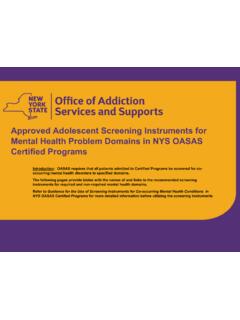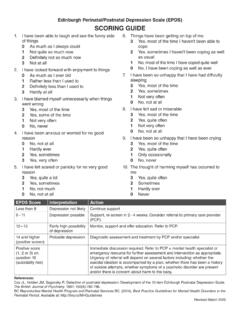Transcription of Mental Health Care in the Perinatal Period
1 Mental Health care in the Perinatal PeriodAustralian Clinical Practice GuidelineOctober 2017 Australian Clinical Practice Guideline | 2 The Centre of Perinatal Excellence (COPE) is an independent, not-for-profit organisation. Since COPE s establishment in June 2013, it has been the policy of the COPE Board not to accept funding from, nor partner with pharmaceutical companies. None of COPE s activities are funded by pharmaceutical companies. This allows COPE to retain independence and impartiality and promote evidence-based approaches to Perinatal Mental Health . Copyright statementThis work is copyright. You may download, display, print and reproduce this material (in whole or in part) in unaltered form only (retaining this notice) for your personal use or internal use within your organisation, but only if you or the organisation do not use the reproduction for any commercial purpose and retain this notice as part of that reproduction.
2 Apart from any use as permitted under the Copyright Act 1968 and this notice, all other rights are expressly and inquiries concerning reproduction and rights should be sent to Communications Branch, Department of Health , GPO Box 9848, Canberra ACT 2601 or is a general guide to appropriate practice, to be followed subject to the relevant clinician s judgement in each individual case. COPE has taken all reasonable steps to ensure that the Guidelines is based on, and accurately represent, the best available published evidence on key areas of antenatal , COPE does not accept any legal liability for any loss, damage, costs or expenses that may result from reliance on the information and recommendations contained in this literature reviewThe systematic literature review that provides the evidence base for this Guideline was conducted by writingAmpersand Health Science Writing was responsible for drafting and editing the Guideline in consultation with the EWG.
3 Expiry of the GuidelineThis Guideline was submitted to the National Health and Medical Research Council (NHMRC) in August 2017 and approved in October 2017. Approval for the Guideline by the NHMRC is granted for a Period not exceeding 5 years, at which date the approval expires. The NHMRC expects that all guidelines will be reviewed no less than once every 5 years. Readers should check with COPE for any reviews or updates of this Guideline. Suggested citationAustin M-P, Highet N and the Expert Working Group (2017) Mental Health care in the Perinatal Period : Australian Clinical Practice Guideline. Melbourne: Centre of Perinatal acknowledges the funding provided by the Australian Government Department of Health for the development of this approvalThe guideline recommendations on pages 7-12 of this document were approved by the Chief Executive Officer of the National Health and Medical Research Council (NHMRC) on 17 October 2017 under section 14A of the National Health and Medical Research Council Act 1992.
4 In approving the guideline recommendations, NHMRC considers that they meet the NHMRC standard for clinical practice guidelines. This approval is valid for a Period of five is satisfied that the guideline recommendations are systematically derived, based on the identification and synthesis of the best available scientific evidence, and developed for Health professionals practising in an Australian Health care publication reflects the views of the authors and not necessarily the views of the Australian Government. 2017 Commonwealth of Australia as represented by the Department of HealthForward | 3 ForewordThe Centre of Perinatal Excellence (COPE) and the Expert Working Group are pleased to issue Mental Health care in the Perinatal Period : Australian Clinical Practice Guideline.
5 The purpose of the Guideline is to support Health professionals in providing evidence-based care . While the focus of the Guideline is on women, the effects of maternal Mental Health on infants and families and the emerging evidence on paternal Perinatal Mental Health are Guideline is relevant to the care of all women in the Perinatal Period . In addition to screening and psychosocial assessment, the Guideline provides guidance on care for women with depressive and anxiety disorders, severe Mental illnesses (schizophrenia, bipolar disorder and postpartum psychosis) and borderline personality disorder at this Guideline includes discussion of: supporting emotional Health and wellbeing of women screening for symptoms of depression and anxiety and assessment for psychosocial factors that affect Mental Health assessing mother-infant interaction and the safety of the woman and infant referral and care pathways for women who require further assessment or care care planning for women with diagnosed Mental Health conditions psychological approaches to prevention and treatment of depressive and anxiety disorders prescribing in pregnant and breastfeeding women, in terms of potential risks (harm to fetus/infant)
6 And benefits potential areas for future development to support the sustainable and measurable implementation of best Guideline does not cover: the diagnosis or specifics of managing Mental Health conditions in the Perinatal Period routine assessment of specific social and lifestyle factors that affect Perinatal outcomes and may also be associated with Mental is hoped that the implementation of the recommendations in this Guideline will: increase rates of screening for depressive and anxiety disorders and reduce the severity of disorders (through early identification) and hence the need for specialist care lead to consistent approaches to assessment of psychosocial risk support the development of clear referral pathways for Health professionals to refer women to suitably qualified Health professionals and/or online treatments for the provision of timely recommended psychological treatments support a safe and balanced use of pharmacological treatments in the Perinatal resources and companion documents for women and their families, and for specific groups of Health professionals, will be developed from the the organisation overseeing the development of the Guideline.
7 COPE will monitor the uptake of the Guideline to assess its contribution to changes in practice and potentially to Health Marie-Paule Austin Dr Nicole HighetChair, Expert Working Group Co-Chair, Expert Working GroupAustralian Clinical Practice Guideline | 4 ContentsForeword 3 Summary 6 Summary of recommendations and practice points 7 Introduction 13 PART A BACKGROUND INFORMATION 151 Mental Health conditions in the Perinatal Period 16 Understanding the woman s context 16 Prevalence and impact of maternal Mental Health conditions in the Perinatal Period 16 Perinatal Mental Health in men 182 Enabling effective Mental Health care in the Perinatal Period 20 Therapeutic relationship 20 care provision 21 Support and
8 Information 22 Continuity of care 22 PART B SCREENING AND PSYCHOSOCIAL ASSESSMENT 233 Considerations before screening and psychosocial assessment 244 Acceptability of screening and psychosocial assessment 25 Acceptability of screening among Health professionals and women 25 Barriers to routine Perinatal screening, follow-up assessment and treatment 25 Facilitators of screening and subsequent Mental Health care 255 Screening for depressive and anxiety disorders 27 Screening for depression 27 Culturally appropriate screening for depression 29 Screening for anxiety 296 Assessing psychosocial factors that affect Mental Health 31 Psychosocial assessment tools 31 Other considerations in psychosocial screening 327 Assessing mother-infant interaction and safety of the woman and infant 34 Mother-infant interaction 34 Risk to the infant 35 Risk of
9 Suicide 358 Implementing psychosocial assessment and screening 38 Incorporating psychosocial assessment and screening into routine practice 38 General approaches post-assessment 38 Referral and care pathways 38 Supporting emotional Health and wellbeing 39 Women with complex presentations 409 Practice summary screening and assessment 41 Contents | 5 PART C PREVENTION AND TREATMENT 4310 General principles in prevention and treatment 44 care planning 44 Use of pharmacological treatments 45 postnatal care and support 4711 Depressive and anxiety disorders 49 Women at risk of depressive or anxiety disorders 49 Women with mild to moderate depression or anxiety 49 Women with moderate to severe depressive or anxiety disorder 5112 Severe Mental illnesses.
10 Schizophrenia, bipolar disorder and postpartum psychosis 54 Preconception planning 54 Considerations in providing antenatal and postnatal care 54 Psychosocial and psychological treatments 54 Pharmacological therapies 5513 Borderline personality disorder 58 Considerations in providing antenatal and postnatal care 58 Psychosocial support and psychological treatments 59 Pharmacological treatments 6014 Electroconvulsive therapy 6115 Practice summary prevention and treatment 62 PART D: AREAS FOR FUTURE RESEARCH 66 APPENDICES 68 A Membership of the expert working group and subcommittees 69 Membership of the Expert Working Group 69 Membership of the Harms Expert Subcommittee 71 Membership of the Borderline Personality Disorder and Schizophrenia Subcommittee 71 Guideline development team 72 B Administrative report 73 B1 Scope and purpose 73 B2 Stakeholder involvement





